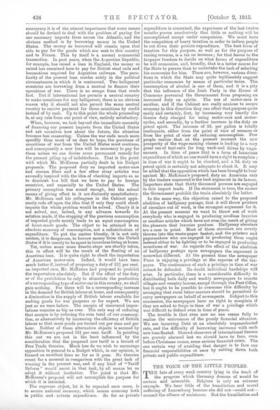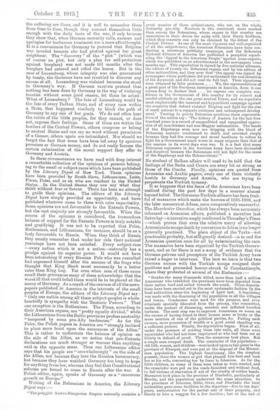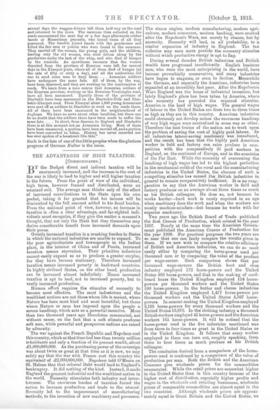THE VOICE OF THE LITTLE ,PEOPLES.
THE fate of every weak country lying in the track of the progress which Germany dreams of would be certain and miserable. Belgium is only an extreme example. We hear little of the humiliation and moral suffering of 'Luxemburg because she did not—could not— commit the offence of resistance. But the humiliation and the suffering are there, and it is well to remember them from time to time, though they connect themselves little enough with the daily facts of the war, if only because they show that, when German necessity calls, excuses and apologies for barbarous treatment are a mere afterthought. It is a convenience for Germany to pretend that Belgium was invaded because she had plotted against her great neighbour. The " discovery " of the " plot " (which was of course no plot, but only a plan for self-protection against burglars) was not made till months after the burglars had entered and rifled the house. But in the case of Luxemburg, whose integrity was also guaranteed by treaty, the Germans have not troubled to discover any excuse at all. Luxemburg was violated because she stood in Germany's way. If German casuists pretend that nothing has been done by Germany in. the way of violating treaties without some good reason, let them be asked : What of Luxemburg ? The fate of Luxemburg would be the fate of every Balkan State, and of every race within a State, that happened similarly to block the path of Germany to any one of her goals. We do not often hear the voices of the little peoples, for they cannot, or dare not, express their feelings. Some of them are within the borders of the Central Powers, others comprise or belong to neutral States and can say no word without permission of a Censor, others again are intimidated, Nor should we forget the fact that some have been led away by specious promises or German money, and do not really foresee the certain culmination of the moral support they offer to Germany and Austria.
In these circumstances we have read with deep interest a remarkable collection of the opinions of persons belong- ing to the small or subject races which have been published by the Literary Digest of New York. These opinions have been provided by South Slays, Lithuanians, Letts, Finns, Poles, and so on Whe are resident in the United States. In the United States they can say what they think without fear or favour. There has been no attempt to guide their opinions. The editors of the Literary Digest have simply provided an opportunity, and have published whatever came to them with calm impartiality. Some opinions are not favourable to the Entente Powers, but the vast majority are strongly favourable. When the source of the opinions is considered, the tremeudous balance of support for the Entente Powers is truly notable and gratifying. It was not to be expected that Poles, Ruthenians, and Lithuanians, for instance, should be as a body favourable to Russia. When they think of Russia they merely remember that under her rule their national yearnings have not been satisfied. Every subject-race —every nation which is not a nation—naturally has a grudge against its superior power. It would not have been astonishing if every Russian Pole who was consulted had expressed himself after the manner of the frogs who thought that King Stork must necessarily be a better ruler than King Log. Yet even when men of these races recall their grievances many of them acknowledge that the worst ill that could befall them would be to be placed at the mercy of Germany As a result of the canvass of all the news- papers published in America in the interests of the small peoples of Europe, the editors of the Literary Digest say : "Only one nation among all these subject-peoples is whole- heartedly in sympathy with the Teutonic Powers." That one exception is the Ruthenians. The Finns, according to their American organs, are "pretty equally divided," while the Lithuanians from the Baltic provinces profess neutrality "tempered by some pro-Ally tendencies." As for the Poles, the Polish papers in America are "strongly inclined to place more trust upon the assurances of the Allies." This is rather to understate the balance of opinion on the side of the Allies, as we notice that pro-Entente declarations are much stronger or warmer than anything said in the opposite sense. Thus one Lithuanian editor says that his people are " overwhelmingly " on the side of the Allies, not because they love the Russian bureaucracy, but because they have watched Germany too long to hope for anything from her, whereas they feel that Constitutional reforms are bound to come in Russia after the war. A Polish editor, again, speaks of Germany as a "cancerous growth on Europe."
Writing of the Bohemians in America, the Literary Digest says :-
"The polyglot Austro-Hungarian Empire naturally contains a
groat number of these subject-races, who are, on the whole, distinctly pro-Ally. Nowhere is this sentiment more marked than among the Bohemians, whose organs in this country are unanimous in their desire for unity with their Slavic brethren, which they conceive can only be obtained by the defeat of the Central Powers. As one of the most vigorous and well-organized of all the subject-races, the American Bohemians have been con- ducting a strenuous publicity campaign, and the Bohemian National Alliance of America has published a pamphlet repudi- ating the 'Appeal to the American People' against arms-exports, which was published as an advertisement in the newspapers some months ago. This repudiation is signed by five national alliances, the editors of twenty-six Bohemian organs, and by ten editors of other nationalities, and they aver that the appeal was signed by newspapers whose publishers did not understand the real intention of the document and did not read its full text. Their signatures wore obtained by false pretences. . . • We, the representatives of a great part of the European immigrants in America, deem it our solemn duty to declare that . , . we express our complete con- fidence in the Government of this country for its correct and careful attitude as the one great neutral Power, and we repudiate most emphatically the immoral and hypocritical campaign against the countries that defend violated Belgium and fight for the rise of small nations to a separate existence and unhampered develop ment.' Turning to purely Bohemian questions these representa- tives of the nation say : 'The history of Austria for the last four hundred years is a record of unparalleled and unequalled oppres- sion of all non-German and non-Magyar nationalities. The hands of the Hapsburgs even now are dripping with the blood of Bohemian martyrs condemned to death and executed simply because they had the courage and moral backbone to refuse to fight for a Government much worse in many respects than that of the czarism in its worst days ever was. It is a fact that many Bohemian regiments in the Austrian Army have been decimated and dissolved because the Bohemians will not fight for the cause of the Hapsburgs and the Hohenzollerne " No student of Balkan affairs will need to be told that the feelings of the Serbs and Croats are every bit as strong as those of the Czechs. Finally, opinions are quoted from Armenian and Arabic papers, every one of them violently hostile to Germany and Austria, who are trying to perpetuate the Turkish tyranny. It so happens that the fears of the Armenians have been realized during the past few days in a manner almost beyond belief. The Germano-Turkish alliance has been fruit- ful of massacres which make the horrors of 1895-1898, and the later massacre at Adana, seem comparatively uneventful. The Manchester Guardian, which has always been accurately informed on Armenian affairs, published a narrative last Saturday—a narrative amply confirmed in Thursday's Times —which proves that even the relative mercy of allowing Armenians to escape death by conversion to Islam is no longer generally practised. The plain, object of the Turks—not practicable probably, but still greatly desired—is to end the Armenian question once for all by exterminating the race. The massacres have been organized by the Turkish Govern- ment, and so far there is not a scrap of evidence that the German patrons and preceptors of the Turkish Army have raised a finger to intervene. The best we learn is that two German nurses with the Turkish troops resigned their positions and proceeded horror-struck to Constantinople, where they protested at several of the Embassies :— " Besides the many thousands killed, more than half a million Armenians who inhabited the provinces have been deported from their native land and exiled towards the south. These deporta- tions have been carried out in the most systematic fashion by the local authorities since the beginning of April last. A beginning was made with the disarming of the population in all the villages and towns. Gendarmes were used for the purpose, and even criminals specially liberated from the prisons, who committed, under the pretext of disarming, murders and inflicted horrible tortures. The next step was to imprison Armenians en masse on the excuse of having found in their houses arms or books or the more mention of one of the political parties, &o. Failing such excuses, more possession of wealth or a good social standing was a sufficient pretext. Finally, the deportation began. First of all, under the pretence of sending them into exile, all those were expatriated who had not been imprisoned or who had been set at liberty in default of proof. Then the massacres took place. Not a single man escaped death. The remainder of the population— old folk, women, and children—were looked upon as fair game in the province of Kharput, and were put at the disposal of the Nfussul- man population. The highest functionary, like the simplest peasant, chose the woman or girl that pleased him best and took her as his wife, converting her by force to Islamism. As for the little children, as many of them were taken as wore wanted, and the remainder were put on the roads famished and without food, to fall victims of starvation if not of the cruelty of robber bands. Massacres took place in the province of Diarbekir, particularly at Merdin, and the population underwent the same atrocities. In the provinces of Erzerum, Bitlis, Sivas, and Diarbekir time local authorities gave some facilities to the deportees—five to ten days' grace' authorization for the partial sale of their property, and liberty to biro a waggon for a few families ; but at the end of several days the waggon-drivers left them half-way on the road skald returned to the town, The caravans thus collected on the roads encountered the next day or a fow days afterwards robber bands or Mussulman peasants, who looted them of all they possessed. The bandits joined hands with the gendarmes and killed the few men or youths who were found in the caravans. They carried off the women, the young girls, and the children, leaving only the old women, who were driven along by the gendarmes under the lash of the whip, and who died of hunger by the roadside. An eyewitness recounts that the women deported from the province of Erzerum were left for several days in the Kharput plain, where all of them died of hunger (at the rate of fifty or sixty a day), and all the authorities did was to send some men to bury them. . . . Armenian soldiers have undergone the same fate, All of them, by the way, have been disarmed, and they are working on the construction of roads. We learn from a sure source that Armenian soldiers of the Erzerum province, working on the Erzerum-Yerzhingha road, have all been massacred. Equally those of the province of Diarbekir have been massacred on the Diarbekir-Urfa and Diar- bekir-Kharput road. From Kharput alone 1,800 young Armenians were sent off as soldiers t Diarbekir to work on the roads there. All of them have been massacred in the neighbourhood of Arghene. We have no news about other localities, but there can be no doubt that the soldiers there have been made to suffer the same fate. . . . In short, from Sansum to Seghert and Diarbekir there is at this moment not an Armenian living. Most of them have been massacred, a portion have been carried off, and a portion have been converted to Islam. History- has never recorded nor has ever spoken of a hecatomb like this."
Such is the fate of one of the little peoples when the glorious progress of German Kultur is the issue.
















































 Previous page
Previous page